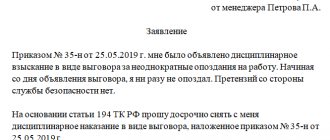Types of disciplinary sanctions
In Art. 192 of the Labor Code of the Russian Federation there are three main types of disciplinary sanctions:
- comment;
- rebuke;
- dismissal.
There are two more measures that apply to certain categories of workers: a severe reprimand (for civil servants and employees of internal affairs bodies) and a warning about incomplete official compliance (for prosecutors, customs employees).
The law does not provide for a fine as a disciplinary measure. So the manager should only apply disciplinary sanctions that the law dictates.
Remark and reprimand
The Labor Code does not prescribe the differences between a reprimand and a reprimand, but simply provides a list of disciplinary actions from the easiest to the most serious - dismissal. The employer can outline the difference between these two measures in a local regulation and establish the grounds for their use.
Each measure must correspond to the severity of the offense and take into account the situation and circumstances of the violation (Article 192.5 of the Labor Code of the Russian Federation). The law also requires taking into account the behavior of the employee before the violation of discipline and his attitude towards work (Resolution of the Plenum of the Supreme Court of the Russian Federation of March 17, 2004 No. 2).
In practice, HR officers and directors more often use a reprimand than a reprimand. Both of these measures should draw the employee's attention to his misconduct and increase responsibility.
A local regulatory act can also provide for deprivation of a bonus or a proportionate reduction in incentive payment for violation of discipline (appeal ruling of the Supreme Court of the Republic of Tatarstan dated September 26, 2013 in case No. 33-11761/2013).
Disciplinary offenses are also specified in the Resolution of the Plenum of the Supreme Court of the Russian Federation dated March 17, 2004 N 2, for example:
- Employee absence from work. If the employment contract or local act of the company does not describe the specific workplace of the employee, be guided by the definition given by the Labor Code of the Russian Federation in Art. 209.6: this is the place where the employee is located and where he arrives to perform work and which the employer controls directly or indirectly.
- Refusal of special training or medical examination, passing examinations on labor protection, operating rules and safety regulations. This applies to employees who are allowed to work only after completing these processes.
Keep records of exports and imports in the Kontur.Accounting web service. Simple accounting, payroll and reporting in one service
Where to contact
You can challenge a disciplinary sanction in the inspection, commission (KTS), or in court. The procedure will depend on the authority.
Labour Inspectorate
When contacting the labor inspectorate, you must be guided by this algorithm:
- Filing a complaint. The complaint may be submitted in written or electronic form. To submit electronically, you need to use the “OnlineInspection.RF” website. A written complaint is made in free form. However, the document must contain this information: full name of the applicant, contact information, information about the employer, full name of the manager. You need to present all the circumstances of the case and your reasoning. A date and signature are also required. You can submit a complaint in person. An alternative option is a registered letter with an inventory and notification of delivery.
- Getting a response. If the labor inspectorate considers the complaint to be justified, the employer's company will be inspected for violations. Based on the results of the inspection, an order to cancel the penalty is issued.
IMPORTANT! An employee needs to be prepared that his problem will not be solved instantly. The complaint will be considered within 30 days.
Labor Dispute Commission
The Labor Dispute Commission also has the power to cancel a penalty. It can be formed at the initiative of employees (grounds - Articles 384 and 385 of the Labor Code of the Russian Federation). Let's consider the algorithm for contacting the CTS:
- Drawing up an application. The application is completed in free form. However, it must necessarily include this information: full name, circumstances and essence of the complaint, requirements. The document must be dated and signed. It is recommended to complete the application in two copies. One of them remains with the employee. It must be marked with the date of receipt of the document. This paper will confirm that the employee filed a complaint. The employee needs to ensure that the application is registered. The mandatory registration is stipulated by Part 1 of Article 387 of the Labor Code of the Russian Federation.
- Receiving a response from the commission. The CCC considers the complaint within 10 days on the basis of Part 2 of Article 387 of the Labor Code of the Russian Federation.
Based on the results of consideration of the application, a meeting is formed. It must be attended either by the employee himself or his representative. The employee can also submit an application requesting that the dispute be considered without his personal participation. The corresponding right is given in Part 3 of Article 387 of the Labor Code of the Russian Federation. Within 3 days from the date of consideration of the dispute, the employee receives a copy of the decision. It must be signed by the chairman of the commission and certified by a seal (based on Part 3 of Article 388 of the Labor Code of the Russian Federation). Within 10 days after the commission's decision is made, you can appeal it. To appeal, you need to go to court on the basis of Part 2 of Article 390 of the Labor Code of the Russian Federation.
IMPORTANT! If the commission has not considered the complaint in the proper manner, the dispute can be transferred to the level of judicial proceedings (Article 386 of the Labor Code of the Russian Federation).
Court
Going to court is considered the most effective tool for appeal. Let's consider the algorithm of actions:
- Drawing up a statement of claim. The claim must be filed with the judicial authority at the address of the employer's company. The application must contain this information: name of the court, full name and address of the plaintiff, name and address of the defendant, essence of the case, circumstances, argumentation. If the claim is subject to assessment, its value must be indicated. The application must also indicate a list of attached documents. The relevant requirements for the claim are contained in Part 2 of Article 131 of the Code of Civil Procedure of the Russian Federation. The application is signed either by the employee or his legal representative (Part 4 of Article 131 of the Code of Civil Procedure of the Russian Federation).
- Submitting an application. A number of documents must be attached to the application: copies of the claim according to the number of parties to the case, a power of attorney from the representative, documents confirming the stated circumstances, calculation of the amount of recovery. This list of documents is specified in Article 132 of the Code of Civil Procedure of the Russian Federation. If a particular court allows it, you can file a claim electronically.
- Participation in a court hearing. It is advisable that the employee appear at the meeting in person. If this is not possible, you need to send a notice of your absence and attach documents confirming valid reasons. For example, this could be a sick leave certificate. If the reason for failure to appear is considered valid by the court, the hearing is postponed. The plaintiff can also ask the court to consider the case without him.
- Getting a solution. The court decision can be obtained in person in court. If a person was not present at the meeting, a copy of the decision is sent to him by mail within 5 days (Part 1 of Article 214 of the Code of Civil Procedure of the Russian Federation). The decision comes into force within a month. During this period, the employee can file an appeal.
Let's consider the consequences of making a decision in favor of the employee. If an employee does not receive a bonus due to a penalty, the employer is obliged to pay it with interest (based on Article 236 of the Labor Code of the Russian Federation).
ATTENTION! Employees who initiate labor disputes are exempt from paying fees.
Dismissal
The grounds for dismissal are given in Art. 81 of the Labor Code of the Russian Federation, here they are:
- An employee avoids fulfilling his job duties without good reason and more than once. At the same time, the employee has already been reprimanded or reprimanded, and they have not been withdrawn (clause 5 of Article 81 of the Labor Code of the Russian Federation).
- Violation of labor duties in a gross form (theft, absenteeism, violation of labor protection requirements, coming to work drunk (clause 6 of Article 81 of the Labor Code of the Russian Federation).
- For the chief accountant, director/deputy director - damage to the organization’s property due to an unreasonable decision or unlawful use of property (clause 9 of article 81 of the Labor Code of the Russian Federation).
- For an employee who is responsible for the company’s finances or commodity assets - committing such actions within the framework of his position, due to which management lost confidence in the employee (clause 7 of Article 81 of the Labor Code of the Russian Federation).
- For an employee with educational responsibilities - committing immoral actions within the framework of the position that are incompatible with work (clause 8 of Article 81 of the Labor Code of the Russian Federation).
- For an employee who did not take measures to prevent and resolve a conflict of interest in which he participated (clause 7.1 of Article 81 of the Labor Code of the Russian Federation).
Dismissal also applies to an employee who refuses to perform job duties after a change in the terms of the employment contract and labor standards at the enterprise. True, in this case, dismissal does not become a disciplinary sanction, and the parties terminate the employment contract under clause 7 of Part 1 of Art. 77 of the Labor Code of the Russian Federation, observing the procedure set out in Art. 74 Labor Code of the Russian Federation.
How long can an employee file a complaint?
The period established by law within which an employee can submit the relevant documents and appeal a reprimand is three months.
It is worth noting that a more reliable option would be to formally issue supporting certificates in the HR department, rather than simply handing over the documents to management.
Then the commission, which deals with the settlement of labor disputes, will be obliged to consider appealing the reprimand within ten days from the date of submission of the package of necessary documents.
Consideration of an appeal is possible only if there is a written application.
How to express disagreement with a signed disciplinary order?
There is also a certain procedure for appealing a penalty if the employee considers the claims regarding his work to be unfair.
After the employer receives written notice, the employee will need to write an explanatory note in which he will detail and explain the reason for his violation or misconduct. It is also worth considering that there must be two copies.
The next step is to contact the labor dispute committee or the relevant inspectorate.
The employee must present an explanatory note, a statement and a copy of the order to impose disciplinary liability.
Then all that remains is to wait for the decision of the commission, which will either consider the punishment to be erroneous, or, on the contrary, decide that the penalty was deserved.
The Labor Dispute Inspectorate may force the employer to lift the disciplinary sanction against the employee if all requested documents are attached and witness statements are submitted.
Procedure for issuing disciplinary sanctions
The rule for disciplinary action is simple: one offense results in one penalty.
First of all, the employer documents the fact of the violation: issues an order to conduct an internal inspection, receives a conclusion and an internal inspection report or a memo addressed to the manager. Such a document should indicate what the employee did and when, what point of the company rules he violated, and what consequences occurred. The company is obliged to prove the fact of a disciplinary offense and undesirable consequences for the company.
The company also requests a written explanation from the employee about the reasons and circumstances of the misconduct. It is better to document this company request. If the employee is deprived of the right to an explanation, the disciplinary sanction may be considered illegal.
Next, the employee has two days to provide a written explanation. If the employer considers the reasons for the misconduct to be valid, he may not impose a penalty. If the employee does not provide an explanation, the company draws up a statement of refusal to provide an explanation.
After this, the company issues a collection order, and the employee signs it within three working days. If the employer refuses to sign the order, he draws up a report. There is no unified form for such an order, but the document must contain the employee’s full name, position and department, the offense committed and the violated points of the company’s rules, references to accompanying notes, conclusions of an internal audit, explanatory note, etc., as well as the type of penalty itself.
An entry about the penalty is not made in the work book, unless it is a matter of dismissal. A record of collection is also usually not entered into a personal card in Form T-2, but if necessary, this can be done in the “Additional Information” section.
An employee can appeal the penalty in court and the labor inspectorate.
How to file a claim to appeal a disciplinary sanction?
When filing a claim, you should adhere to the following simple rules:
- Don't try to get emotional. The fact is that the judge evaluates the evidence presented, the motivated arguments that are given. The emotional coloring of the description of the situation on the claim page will only interfere with understanding the essence, and also distract from the main thing.
- No state fee is required for the claim. You can submit your application without paying any fee; according to tax legislation, you are exempt from paying it.
- Proof. Justify what the claims are based on, how they are confirmed, if you need help in obtaining evidence, file a petition to obtain what you need before the court, both at the stage of filing a claim and directly in court.
- Claim requirements. Ask not only to challenge and cancel the order. As part of one appeal to the court, you can demand simultaneously with the requirement to challenge a disciplinary sanction: compensation for moral damage, payment for forced absence, correction of entries in the work book.
- Application of claim. Do not forget to generate and attach documents in the number of copies according to the stated number of parties to your dispute. The court will independently forward claims to the defendant and third parties in preparation for the trial.
USEFUL: watch also the video with advice from a lawyer on filing a claim, write your question about the video
Terms of disciplinary sanctions
The Labor Code prescribes specific deadlines for disciplinary sanctions:
- The penalty is applied within 1 month from the day the offense was discovered. The period may change due to illness and vacation of the employee or the time it takes to take into account the opinions of the representative body of employees.
- Penalty is not applied if six months have passed since the date of the offense.
- Penalty is not applied if six months have passed from the date of the offense and it was discovered as a result of an inspection or audit. But this period does not include the period of criminal proceedings.
- The penalty is valid for 1 year, after which the employee is “clean” again. To automatically remove a foreclosure after a year, you do not need to issue any orders.
- Before the end of the year, the employer may lift the penalty at the request of the employee, his manager or a representative body of employees, as well as on his own initiative. This happens if the employee works flawlessly, exceeds plans, and introduces new methods into work. In this case, you will have to issue an order to remove the penalty.
- A change of position does not affect the timing of penalties in any way.
There are still circumstances that need to be taken into account. If within a year after the first penalty the employee received a new “sanction,” the period of the first penalty is counted anew from the moment the second one was imposed (commentary to Article 194 of the Labor Code of the Russian Federation). Two penalties on an employee’s account are already repeated violations of the labor regime, and then the manager can use an extreme measure of influence - dismissal.
Advantages of filing a claim to appeal a disciplinary sanction
Due to his legal illiteracy, the employee often feels unprotected. In such cases, the employee most often resorts to a verbal altercation with his employer, which, as a rule, leads nowhere, and he has no choice but to accumulate resentment towards his employer within himself.
Ultimately, such a situation can lead to very unfavorable consequences for the employee, because if such a situation has already arisen once, it may well repeat again with a greater negative result. In the best case, an employee can simply write a letter of resignation of his own free will, or he may be dismissed at the initiative of the employer.
- You will be able to appeal and invalidate the illegally applied punishment to you.
- If a disciplinary sanction is the reason for dismissal on appropriate grounds, then you have the opportunity to challenge the unlawful dismissal, be reinstated in your position and demand compensation in court for the period of forced absence;
- In addition to restoring justice in working relationships, you also have the opportunity to recover from a negligent employer moral damages in monetary terms caused to you by the employer’s illegal actions;
- The procedure for appealing a disciplinary sanction will also lead to the restoration of your reputation in the workforce and will protect your right to a good name.
Company fines for violating employee rights
For incorrect application of a disciplinary sanction, the employer will receive a warning from the labor inspectorate or an administrative fine (Part 1 of Article 5.27 of the Code of Administrative Offenses of the Russian Federation):
- for an accountant, director or personnel officer - from 1,000 to 5,000 rubles;
- for an organization - from 30,000 to 50,000 rubles.
In case of repeated violation, the fines are increased (Part 2 of Article 5.27 of the Code of Administrative Offenses of the Russian Federation):
- for officials - from 10,000 to 20,000 rubles fine or disqualification for 1-3 years;
- for organizations - from 50,000 to 70,000 rubles.
Maintain personnel, accounting and tax records in the Kontur.Accounting web service. The system is suitable for small businesses and contains all the tools an accountant needs. The first two weeks of work are free for all newbies.










